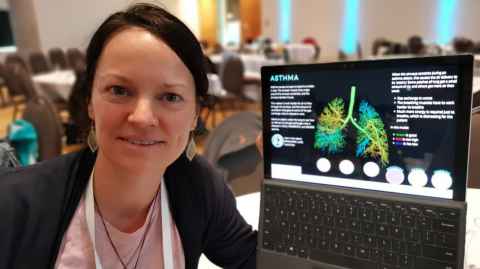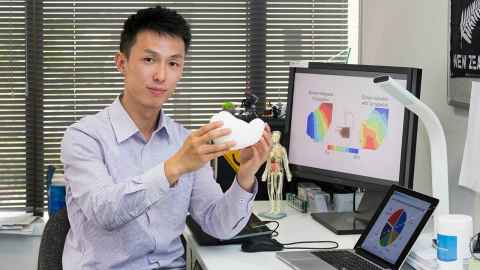Getting to the guts of the matter, both vaping and the gastrointestinal system
11 November 2020
Researchers at the Auckland Bioengineering Institute (ABI) investigating the vaping puzzle, and the finer points of our gut, have been awarded over two million by Te Pūtea Rangahau a Marsden, the Marsden Fund.

Dr Kelly Burrowes from the ABI has received almost $900,000, with which she aims to revolutionise our understanding of electronic cigarettes (ECs) and their impact on lung health.
While ECs are touted as a safer alternative to conventional cigarettes, and could be viewed as a “lesser of two evils” for current cigarette smokers “the health effects of vaping is still a big unknown” says Dr Burrowes.
There has been a steady growth in sales worldwide since ECs appeared in the market and in Aotearoa New Zealand, 3.2 percent of adults use an EC at least once a day. “Yet smokers, healthcare providers and regulators need to be sure that these devices can actually reduce the harm associated with smoking, and we just don’t know enough about them to be sure that they do,” says Dr Burrowes.
“There are major gaps in our understanding of their short-term and long-term health effects, and while this is being addressed by a range of separate research disciplines, there’s poor integration of data across these different research fields, impeding progress towards understanding the potential risks of EC use.”
Dr Burrowes and team will develop a new mathematical framework that integrates different data, including the analysis of what goes into EC aerosols and the effect of those chemicals at a cellular and a whole-organ level on the human lungs.
With the help of state-of-the-art imaging techniques, the team will lead the world’s most advanced study on the impact of EC use on lung health.
Healthcare providers and regulators need to be sure that these devices can actually reduce the harm associated with smoking, and we just don’t know enough about them to be sure that they do.
Dr Timothy Angeli, also at the ABI, has been awarded Marsden funding to research the finer points of the gut – more specifically, how the intestine communicates with the stomach.
“We bite, we chew, we swallow, we defecate,” says Dr Angeli. “These are the conscious actions that we perform during digestion, but there are also other underlying subconscious processes that move and digest food along our gastrointestinal tract to ultimately power our bodies and, if things go wrong, can seriously affect our health.”
His research will focus on a smooth muscle valve called the ‘pylorus’, a band of smooth muscle at the junction between the stomach and the small intestine. It plays a vital role in digestion, acting as a valve to control the flow of partially digested food from the stomach to the small intestine. The pylorus also selectively blocks or transmits different electrical signals between the stomach and intestine, but the mechanisms of this critical electrical communication remain a mystery.
Dr Angeli and his team will, with $300,000 of Fast Start Marsden funding, develop a high-resolution electrode device to map the electrical activity at this critical connection of the gut.
“Understanding the bioelectrical control between the stomach and intestine, across the pylorus, will help us better understand how digestion is coordinated, and may ultimately offer new treatment options to pylorus-related disorders.”
Associate Professor Peng Du, also a member of the Gastrointestinal Research Group at ABI, will also be investigating the GI tract and has been awarded $900,000 in Marsden funding to do so.
Dr Du’s research is aimed at the development of a virtual model of the pylorus as well as two other major sphincters in the gut, the three main ‘muscular gates’ that regulate the flow of food within the gut.
As he points out, the gut is a complex system, and the controlling ‘gates’ are crucial. If the pylorus doesn’t work properly, for instance, we can suffer from what is commonly known as ‘reflux’, a spectrum disorder that can affect people in different ways, from the minor to the severe. “If it’s a more chronic problem, the acid that is being regurgitated into the oesophagus can burn the lining of the oesophagus, which can possibly lead to cancer.”
He and his team will develop comprehensive models that combine X-ray microtomography (micro-CT) and high-resolution electromechanical mapping to create virtual sphincters. This mathematical modelling can then be used to do predictive simulations of sphincter functions under different physiological conditions.
“An integrated modelling framework incorporating both structural and functional data will provide a new foundation that will guide new discoveries of future therapies, to allow for better neuromuscular control of the gut.”
The digestive system is complicated, he says, and depends upon the actions (the closing and opening) of several sphincters in the gut, which are a combination of muscles and nerves and which are not well understood.
“Ideally we hope our research will lead a platform, for more understanding of the neuromuscular control of the gut. There’s a lot we can do modulating and controlling nerves, so if we have a better understanding of the activity of the nerves, we can use that to normalise gut actions when there are problems.”
“The gut is a complex and intricate organ, and normal functioning involves the coordination of contractions at different points in the gastrointestinal tract,” he says.
“This is something we can take for granted until things go wrong, and it certainly lets us know when it does.”

Media contact
Margo White I Media adviser
DDI 09 923 5504
Mob 021 926 408
Email margo.white@auckland.ac.nz